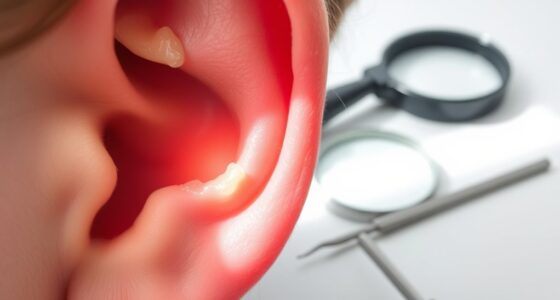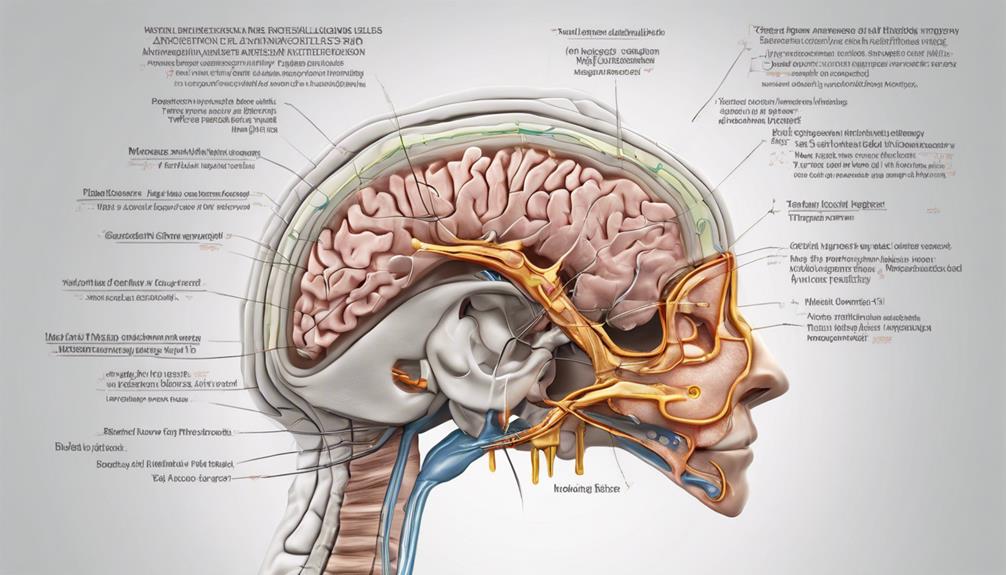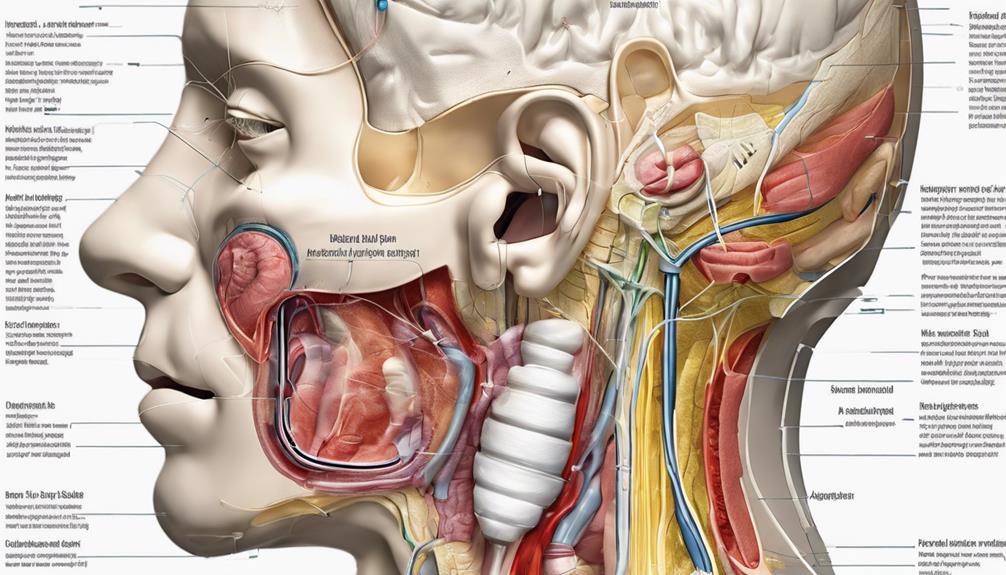Imagine the inner ear like a well-coordinated symphony orchestra, where each component plays a crucial role in producing sound.
Now, imagine a virus sneaking into this concert hall, disrupting the harmony and causing discord among the musicians.
Viral infections have been implicated in various cases of hearing loss, but how exactly do they orchestrate this unwanted tune?
Join us as we explore the intricate mechanisms through which viruses can impact our hearing health, shedding light on a lesser-known aspect of viral pathology that may surprise you.
Key Takeaways
- Viral infections like CMV, Rubella, and HSV can lead to congenital and acquired hearing loss.
- Early detection and prompt management are crucial in minimizing the impact of viral-induced hearing impairments.
- Viruses such as HSV and Varicella-Zoster can cause sudden sensorineural hearing loss.
- Antiviral therapy plays a significant role in managing viral-induced hearing loss.
Viruses Causing Congenital Hearing Loss
Viruses such as CMV, Rubella, and HSV Types 1 and 2 are known culprits in causing congenital hearing loss, a serious condition that affects infants and children worldwide. CMV, a prevalent cause of non-genetic sensorineural hearing loss in infants, can lead to long-term hearing impairments if not detected early.
Similarly, Rubella, commonly known as German measles, poses a risk of congenital hearing loss in children born to mothers infected during pregnancy. HSV Types 1 and 2 are also implicated in congenital or acquired hearing loss cases.
Viral infections contracted during pregnancy, like CMV and Rubella, can result in hearing impairments in newborns, highlighting the importance of regular hearing checks for early detection. These screenings are vital to identify congenital hearing loss promptly and implement interventions to mitigate its impact on infants' auditory development.
Viruses Causing Congenital and Acquired Hearing Loss
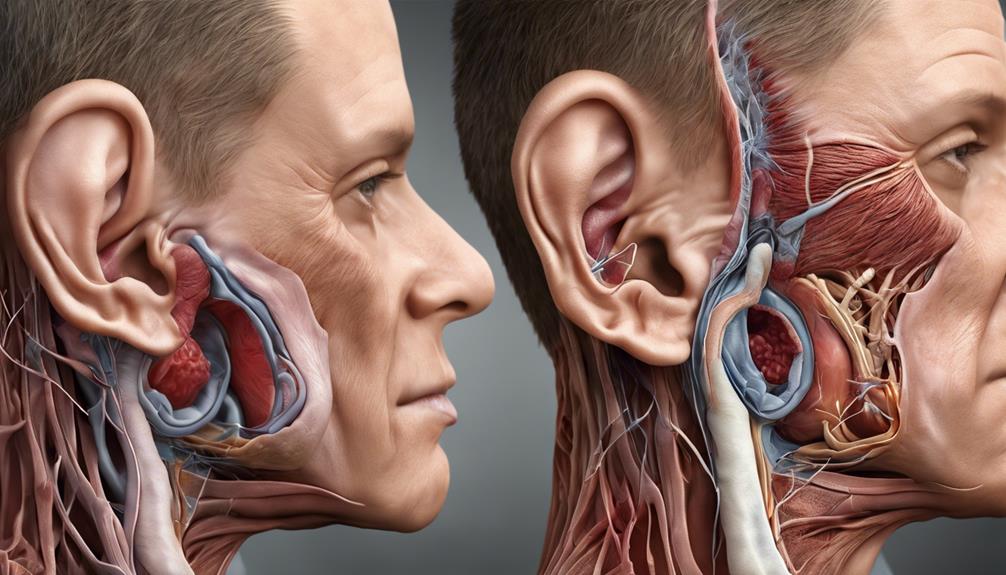
With a direct impact on the cochlea and organ of Corti, Rubella infection can lead to sensorineural hearing loss, underscoring the significance of early detection and intervention in cases of viral-induced hearing impairments. CMV, HSV1, and HSV2 are also culprits in causing congenital and acquired hearing loss.
Here's a breakdown to deepen understanding:
- Rubella: Directly damages the cochlea and organ of Corti, resulting in sensorineural hearing loss.
- CMV: Particularly affects young children and adolescents, contributing significantly to hearing impairment.
- HSV1 and HSV2: Can lead to congenital and acquired hearing loss in infected individuals.
- Importance of Early Detection: Identifying viral infections early is crucial in preventing or minimizing the impact of hearing loss.
These viruses highlight the complexity of viral-induced hearing impairments, emphasizing the necessity of prompt diagnosis and management to mitigate potential long-term consequences.
Viruses Causing Acquired Hearing Loss
Acquired hearing loss caused by viral infections typically manifests as sensorineural impairment. Common pathogens include Rubella, CMV, HSV types 1 and 2, measles, mumps, and Varicella-Zoster Virus. This type of hearing loss affects the inner ear or auditory nerve, impacting the ability to perceive sound accurately.
The viral invasion can lead to damage in the delicate sensory cells or the neural pathways responsible for transmitting sound signals to the brain. Management of viral-induced hearing loss may involve antiviral therapy to target the underlying infection. Additionally, interventions such as hearing aids or cochlear implants could be beneficial in improving hearing outcomes for individuals affected by these viruses.
Vaccination against viruses like rubella and measles holds significance in preventing associated hearing complications, emphasizing the importance of immunization strategies in safeguarding against potential auditory deficits linked to viral infections.
Role of Viral Infection in Sudden Hearing Loss
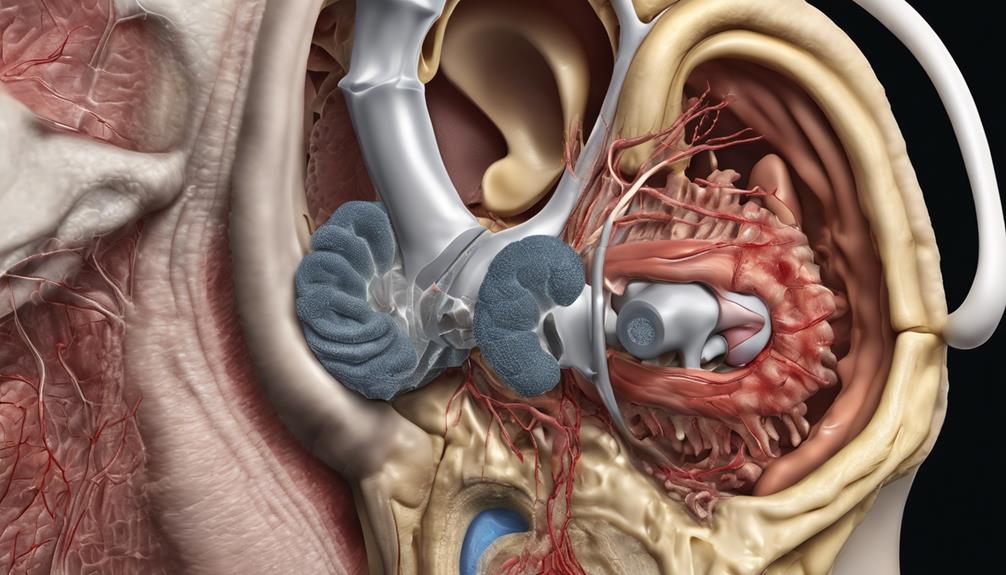
Indirect mechanisms involving viral infections can precipitate sudden sensorineural hearing loss, impacting auditory function swiftly and significantly. When considering the role of viral infections in sudden hearing loss, several key points emerge:
- Direct Invasion: Viruses like herpes simplex virus can directly invade the inner ear structures, leading to rapid-onset sensorineural hearing loss.
- Reactivation: The reactivation of latent viruses such as Varicella zoster virus within the auditory system can trigger sudden deafness due to the inflammatory response.
- Immune Response: Immune-mediated vasculitis-like syndrome triggered by viral infections can damage the blood vessels supplying the inner ear, contributing to sudden sensorineural hearing loss.
- Inflammatory Mediators: TNFα and IL-6, cytokines associated with the immune response, play crucial roles in the pathogenesis and potential treatment strategies for sudden sensorineural hearing loss caused by viral infections.
Viral Illnesses Linked to Hearing Loss
Viruses known to cause hearing loss, such as CMV, Rubella, and HSV1, have been implicated in impacting auditory function in both children and adults. These viruses can lead to sensorineural hearing loss by directly damaging inner ear structures or triggering inflammatory responses. In addition to these, viruses like HIV, HSV2, and Varicella-Zoster Virus can also cause acquired hearing loss. For instance, herpes zoster oticus, caused by the Varicella-Zoster Virus, can affect the inner ear and result in hearing impairment. It is essential to recognize the viral causes of hearing loss as early detection is crucial for prompt intervention. Antiviral therapy has shown effectiveness in managing viral-induced hearing loss, highlighting the importance of timely treatment. Vaccination against viruses such as Rubella and measles plays a significant role in preventing complications like hearing loss. Understanding the viral etiologies of hearing loss is vital for implementing appropriate preventive measures and treatments.
| Viral Causes of Hearing | Congenital and Acquired Hearing | Cause Acquired Hearing Loss |
|---|---|---|
| CMV | Direct damage to inner ear structures | Yes |
| Rubella | Inflammatory responses triggering SNHL | Yes |
| HSV1 | Impacting auditory function | Yes |
Frequently Asked Questions
How Do You Get Rid of Hearing Loss From a Cold?
To get rid of hearing loss from a cold, we recommend seeking prompt treatment to address the underlying cause, which often involves fluid buildup in the ear.
Visiting a healthcare provider for proper diagnosis and management is crucial. This may include medications to alleviate symptoms, such as decongestants or antibiotics if a bacterial infection is present.
Regular follow-ups and monitoring can aid in the resolution of any temporary hearing issues.
How Long Does Hearing Loss Last After a Cold?
Hearing loss duration after a cold can vary, typically lasting from a few days to a few weeks. Factors like overall health, immune response, and cold severity influence this period. In many cases, hearing loss post-cold is temporary, resolving as the body recovers.
Prolonged hearing issues post-cold may indicate an underlying problem, warranting medical attention. Rest, hydration, and avoiding loud noises can aid in recovery.
Why Has My Hearing Suddenly Gone Muffled?
Our hearing may suddenly become muffled due to a variety of reasons, such as fluid buildup in the ear, blockages from earwax, or changes in air pressure. These factors can affect how sound waves travel to the inner ear, resulting in a temporary decrease in hearing acuity.
If this issue persists or worsens, seeking prompt medical evaluation is essential to identify and address the underlying cause.
Why Have I Suddenly Gone Deaf in One Ear?
We suddenly lost hearing in one ear due to various factors. This situation can stem from viral infections like herpes simplex virus or Varicella zoster virus.
The cochlea can be affected by viral invasion or reactivation, leading to rapid-onset hearing loss in one ear. Autoimmune responses triggered by viral infections may also result in sudden deafness. Inner ear damage from direct viral invasion or immune-mediated mechanisms can cause unilateral hearing loss.
Swift evaluation and treatment are critical for potential recovery.
Conclusion
Based on our research, it's clear that viruses can play a significant role in causing hearing loss, both congenital and acquired. From CMV to Rubella, these viral infections can damage inner ear structures and lead to sensorineural impairments.
Just like a stealthy intruder, viruses can silently invade our auditory system, disrupting its delicate balance. Understanding the viral causes of hearing loss is crucial for effective treatment and prevention strategies.



